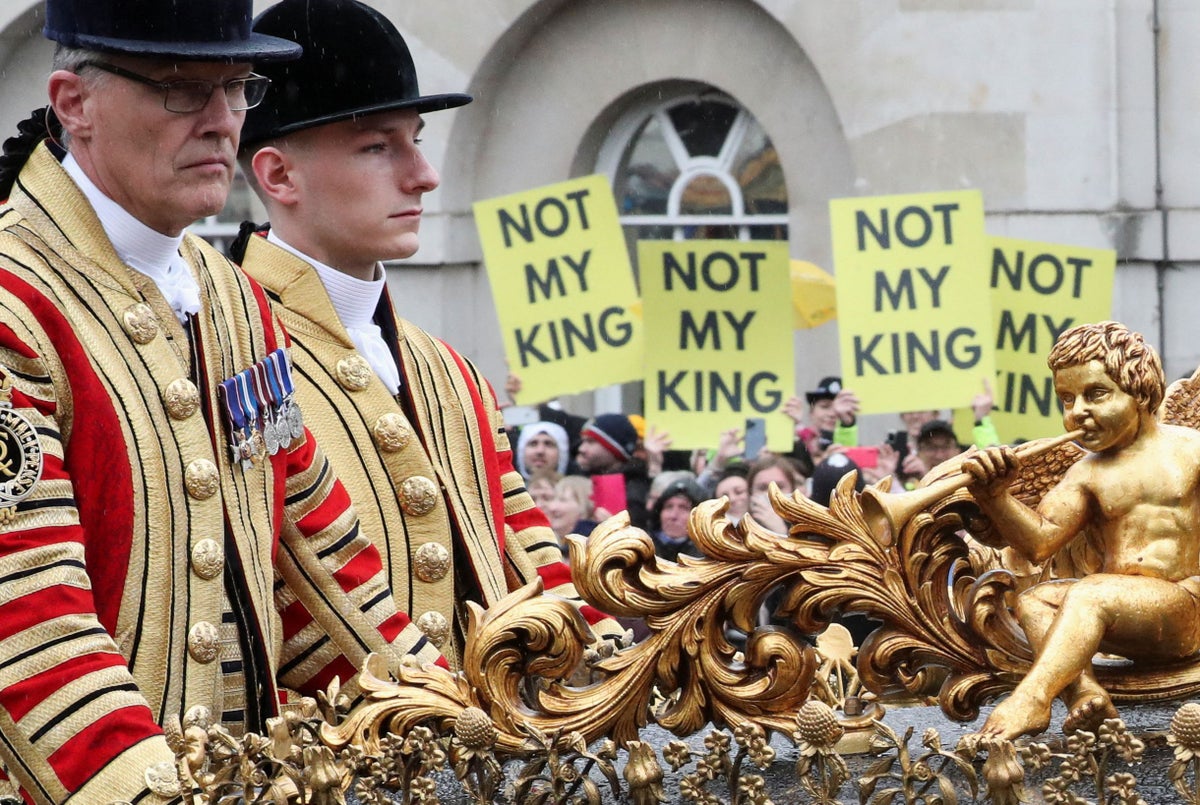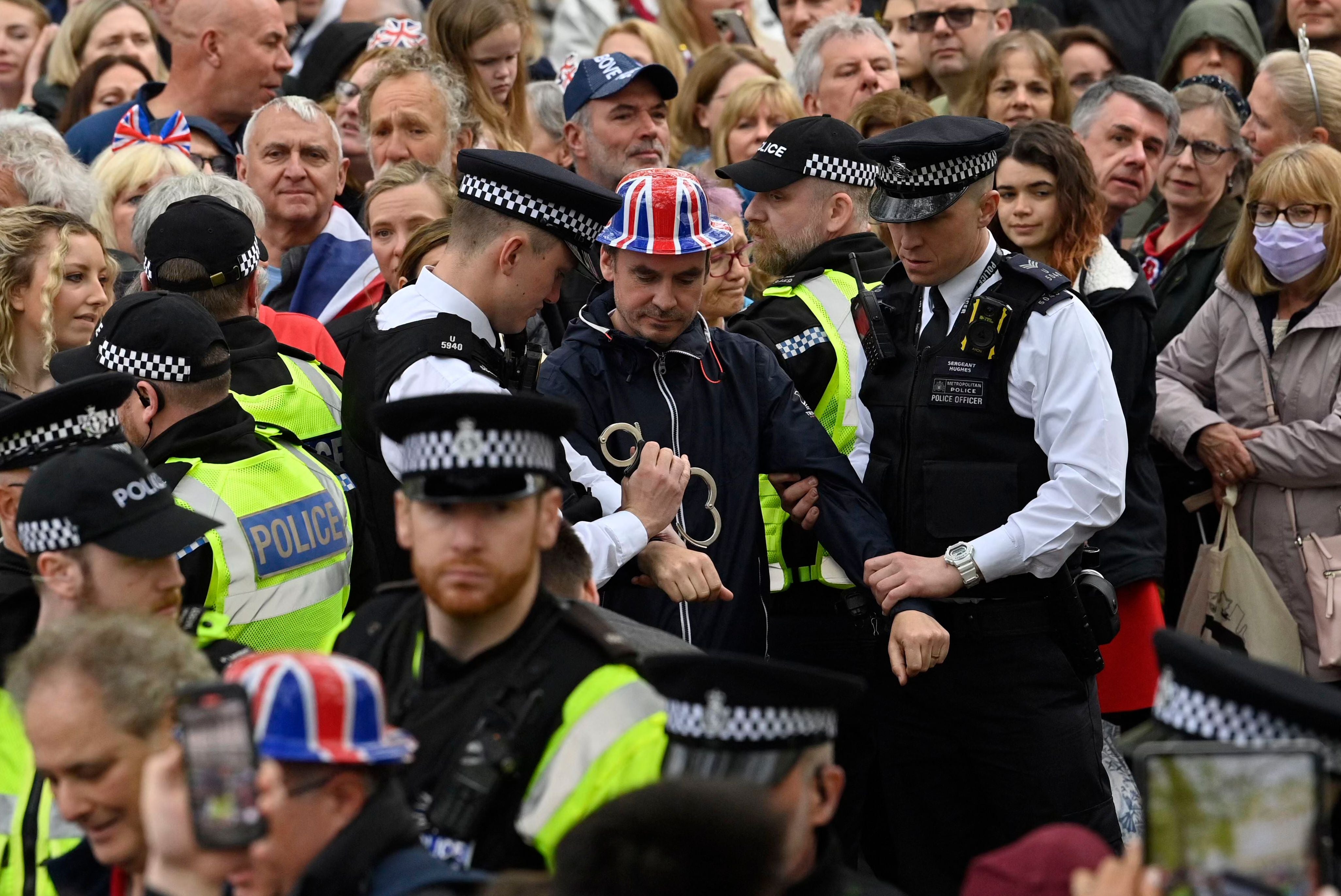
Labour is under pressure to say whether it would scrap the Tories’ new anti-protest law – accused by other opposition parties of being “spineless” in the face of the “chilling” crackdown.
The Public Order Act has been thrust into the headlines after the arrest of republican campaigners before King Charles III’s coronation sparked widespread outrage.
Labour frontbencher Andrew Gwynne said on Monday that a Labour government would “look very carefully at this legislation” – arguing that “we need to see how it’s working”.
The shadow health minister said Metropolitan Police appeared to have been “heavy-handed” in arresting dozens of protesters on Saturday, but would not say the party was committed to repealing the act if it enters government.
“We need to see how it’s working,” he told Sky News. “And if it’s not working in the way the government say it’s intended to work, then that’s something that needs addressing.”
It follows comments by the shadow foreign secretary David Lammy, who suggested a Labour government would be too busy to scrap the law. “We can’t come into office, picking through all the Conservative legislation and repealing it,” he said. “It would take up so much parliamentary time.”
The SNP’s Chris Stephens said Labour was “spineless”, while the Liberal Democrats Alistair Carmichael said any party “happy to support” the new powers “is no supporter of civil liberties and should think again”.
Green MP Caroline Lucas said the Keir Starmer’s party could “overturn this in a day”, adding: “If Labour isn’t going to stand up for fundamental human rights, then that is really chilling and we’re in a very serious place.”
Public Order Act – only signed into law last week – hands police new powers to shut down protests before they occur by lowering the bar for “serious disruption”. It also bans slow marching and can mean a six-month prison sentence for those who use “lock-on” tactics.

Fresh concerns come as a leading Republican campaigner accused the police of making a premeditated attempt to “disrupt and diminish” anti-monarchy protests at the weekend.
Asked if he believed his arrest had been “premeditated” by police, Graham Smith, chief executive of the Republic group, told BBC Radio 4’s Today programme: “Absolutely. I have no doubt about that at all.”
Mr Smith accused Scotland Yard of using some straps for placards as a “pretext” for his arrest, claiming he had been arrested after unloading placards on the suspicion of being equipped to “lock-on” to an object or building.
“The whole thing was a deliberate attempt to disrupt and diminish our protest,” he said. “They stopped us because the law was introduced, rushed in last week, to give them the powers to stop us on any flimsy pretext.”
The campaigner also criticised Sir Keir’s party for failing to pledge to ditch the law. “I understand the Labour Party said they wouldn’t repeal this law – which is pretty disgraceful if true. This law needs to be repealed.”
Mr Sunak backed the Metropolitan Police on Monday, insisting that officers act independently of government based on “what they think is best” after claims they were cracking down at the behest of politicians.

In total the Met made 64 arrests during the coronation day. Four charges have been brought, including over a religiously aggravated public order allegation and class A drugs possession.
Ken Marsh, head of the Metropolitan Police Federation representing officers from the rank of constable to chief inspector, said police were acting both lawfully and “impartially”. But London Mayor Sadiq Khan has demanded “clarity” from the force’s leaders on the arrests.
And Westminster City Council has raised concerns that women’s safety volunteers were among those arrested after rape alarms were seized.
The Met said it had received intelligence that people were planning to use the devices to disrupt the procession. But Caroline Russell, who sits on London Assembly’s Police and Crime Committee, said she will be questioning the Met over the “worrying” arrests.
The Green party politician told Radio 4’s Today: “It seems absolutely extraordinary that those people who were volunteering – they were out there handing out flip flops to people who could no longer walk in their high heels... it just seems extraordinary that they got caught up in the Met’s safety net. How? It just feels very odd.”
A Labour spokesperson made clear that the party opposed the public order bill, saying it continues to believe that the police “already had the powers they need to prevent serious disruption and we continue to believe that things like the measures on suspicionless stop and search are not right”.
They added: “Under a Labour government, new Home Office legislation will be needed in a series of different areas to implement key Labour policies and undo the damage that the Tories have done on issues ranging from violence against women to policing to the chaos in the asylum system.”







